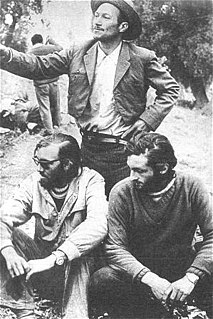A Quote by Agatha Christie
fiction is founded on truth....unless things did happen,people couldn't think of them.
Related Quotes
THE MAGIC AND THE DANGER OF FICTION IS THIS: it allows us to see through other eyes. It takes us to places we have never been, allows us to care about, worry about, laugh with, and cry for people who do not, outside of the story, exist. There are people who think that things that happen in fiction do not really happen. These people are wrong.
Expectations are usually predicated on the idea that the everyday things that happen to ordinary people shouldn't happen to you. People hold the idea of being ordinary in absolute contempt, so when they face an illness, poverty, or any kind of catastrophe, they say, "I can't believe this happened to me." And who did you think it was going to happen to - the woman across the street? It makes them think, "I must be on the wrong path." But what if something you thought was bad was the best thing that ever happened to you? What if that was part of your path?
Sometimes I don't tell the truth, which is telling the truth about not telling the truth. I think people don't tell the truth when they're afraid that something bad's going to happen if they tell the truth. I say things all the time that I could really get into trouble for, but they kind of blow over.
Truth is always stranger than fiction. We craft fiction to match our sense of how things ought to be, but truth cannot be crafted. Truth is, and truth has a way of astonishing us to our knees. Reminding us, that the universe does not exist to fulfill our expectations. Because we are imperfect beings who are self-blinded to the truth of the world’s stunning complexity, we shave reality to paper thin theories and ideologies that we can easily grasp – and we call them truths. But the truth of a sea in all it’s immensity cannot be embodied in one tidewashed pebble.
I think one of the things that is important, for me, though a lot of people would disagree with me, is that you be founded in theater so that you understand what an audience is, what kind of an animal it is and how to play with it. How to have fun with it, how to sympathize with it, all the things that an audience is. I don't think you're going to find that out unless you do theater.
The people that say diversity is the reason for the greatness are purposely assaulting the United States as founded. They want you to believe that America was only great for a few people as founded, because, as founded, America was gigantically discriminating against the poor and against people of color and against transgenders. Yeah, I've read the Federalist Papers, you know. James Madison, he wasn't popular with the transgender group back then. Did you know that? You won't find the word. It was not a factor, the way they have attempted to modernize things here today. It's just lies.
I have always been intensely uncomfortable with the idea of a science fiction writer as prophet. Not that there haven't been science fiction writers who think of themselves as having some sort of prophetic role, but when I think of that, I always think of H.G. Wells - he would think of what was going to happen, and he would imagine how it would happen, and then he would create a fiction to illustrate the idea that he'd had. And no part of my process has ever resembled that at all.
Expectations are usually predicated on the idea that the everyday things that happen to ordinary people shouldn't happen to you. People hold the idea of being ordinary in absolute contempt, so when they face an illness, poverty, or any kind of catastrophe, they say, 'I can't believe this happened to me.' And who did you think it was going to happen to - the woman across the street?
People say it's not what happens in your life that matters, it's what you think happened. But this qualification, obviously, did not go far enough. It was quite possible that the central event of your life could be something that didn't happen, or something you thought didn't happen. Otherwise there'd be no need for fiction, there'd only be memoirs and histories.
I think life is simpler than we tend to think. We look for answers and more answers. But there are no answers. Things happen in life, good things and bad. People say, 'Why did it happen to me?' Well, why not? Some people win the lottery, and others die in a car crash. It happens, and there is nothing we can do about it. The universe doesn't care what happens to you.




































